Library of Congress's Blog, page 29
September 23, 2022
An Evening with Hazel Scott, Sept. 28!
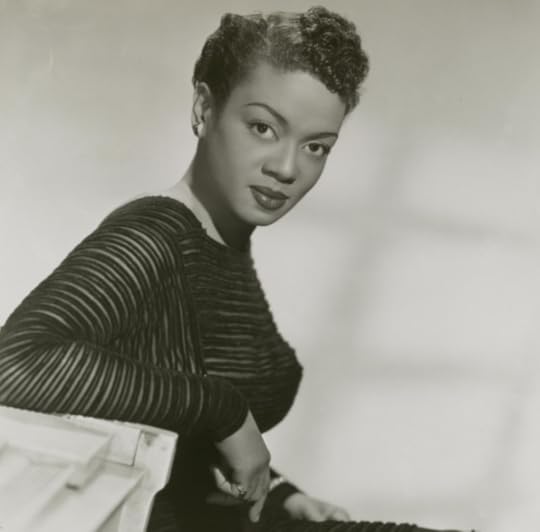
Hazel Scott, intense and assured, in an undated publicity shot. Photo: Unknown. Prints and Photographs Division.
This is a guest post by Anne McLean, a music specialist in the Music Division.
On Sept. 28 — that’s Wednesday — the Music Division partners with Dance Theatre of Harlem and Washington Performing Arts to present a special event saluting a pathbreaking Black artist: “Celebrating Hazel Scott: Pianist, Singer, Actress and Activist.”
The evening offers a display from the Library’s Hazel Scott collection and a sneak-peek excerpt from a new ballet created to honor her, “Sounds of Hazel.” Dance Theatre of Harlem company member Daphne Marcelle Lee will perform a brief segment to a recording by Scott herself. Biographer Karen Chilton will moderate a discussion on Scott’s life and legacy with choreographer Tiffany Rea-Fisher; Virginia Johnson, artistic director of the Dance Theatre of Harlem; Adam Clayton Powell III, Scott’s son; and Music Division archivist Janet McKinney. The event is free but we ask that you do register to attend.
A prodigiously talented jazz and classical pianist, Scott was a glamorous figure, fluent in seven languages, and a brilliant star on stage and screen in the 1940s and early 1950s. As this blog noted it in the January–February issue of LCM, “Hazel Scott was the gorgeous face of jazz at the midcentury.”
She was featured in several Hollywood films, always appearing as herself, a bandleader and formidable pianist, performing virtuosic sets that often juxtaposed classical music and jazz. You can see her tour-de-force turn in the 1943 film “The Heat’s On,” where she plays on two pianos simultaneously while whirling between them on a swiveling stool — a feat to which Alicia Keys paid homage at the 2019 Grammy awards.
Scott’s circle of friends included legendary pianists Fats Waller and Art Tatum — she regarded both as family members — as well as many artists who are icons today: Billie Holiday, Lena Horne, Leonard Bernstein and Dizzy Gillespie, among others.
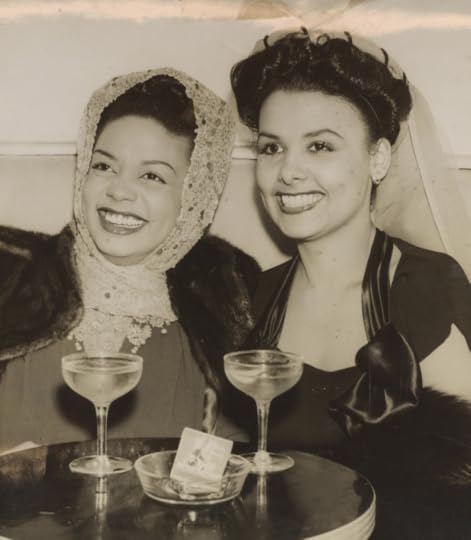
Hazel Scott and Lena Horne, longtime friends, at a night spot in New York. Prints and Photographs Division.
Scott’s marriage to Harlem congressman and minister Adam Clayton Powell Jr. brought her wider fame and heightened visibility as an influential civil rights activist. In 1950, addressing insinuations of Communist sympathies, she insisted on giving testimony before the House Un-American Activities Committee; it was a stance that would cause the cancellation of her new television program, The Hazel Scott Show, and damage an extraordinary career.
The Library’s Scott event starts in the Whittall Pavilion at 5:45 p.m. with a display of treasures from the Scott collection, drawn from nearly 4,000 items, including music, photographs, letters, datebooks and diaries.
At 7 p.m., a short documentary will follow the creative team behind “Sounds of Hazel,” including choreographer Rea-Fisher and composer Erica Lewis-Blunt. Daphne Lee will perform a solo from the ballet set to Scott’s scintillating performance of Frédéric Chopin’s “Minute Waltz,” from the film “Broadway Rhythm.”
“Hazel Scott was a diva with a capital ‘D,’ ” Rea-Fisher said, “but she was also super-grounded. She was not afraid to be raw and rough while also being glamorous.”
Because of her audacious nature, Rea-Fisher added, Scott was erased from history. “So, [celebrating] her for all that she is and was is really super, super exciting.”
Capping off the evening, pianist Janelle Gill will play Claude Debussy’s “Clair de Lune” in a nod to Scott’s classical performances and her own composition “Give Thanks” with bassist Michael Bowie and drummer Lenny Robinson.
September 20, 2022
Connecting Andean Voices and Heritages

Children dressed for Ecuadorian National Day, in New York City, 2021. Photo: Camilo Vergara.
This is a guest post by Giselle Aviles, a reference librarian in the Hispanic Reading Room of the Latin American, Caribbean and European Division.
The Hispanic Reading Room has a new research guide, Interconnecting Worlds: Weaving Community Narratives, Andean Histories & the Library’s Collections. This guide, with resources in English, Spanish and Quechua, facilitates research about Andean peoples through language, literature, visual arts and music.
We used video interviews to connect with Indigenous people from Argentina, Bolivia, and Peru and their communities in New York, Massachusetts and the greater Washington, D.C. area.
My field of study is anthroplogy, but I am also trained in documentary films. When I looked at our Indigenous digital collections, I couldn’t help but feel they were disconnected from the communities they represented. So in creating this research guide, I envisioned resources in languages that represented the communities in their home countries and in the U.S. as a way of making the items in the collections – photographs, maps, books and so on – come alive. I wanted these communities, like all others, to feel like we were preserving their stories in their voices. That’s what the national Library is supposed to do. Three interns — Monica Soto, A.B. Bejar, and Pamela Padilla — worked with me and did an incredible job in 10 weeks of summer internship!
The guide is divided into eight sections with an introduction to the Andean world followed by themes of language, storytelling, poetry, arts, photography, textiles and music.
In Runasimi: the Language of the People, Dr. Américo Mendoza-Mori, professor at Harvard University, explains the importance of “creating more spaces to recognize disciplines and traditions of knowledge that for so long were overlooked or just seen as objects of study.” For him, “the displacement that many heritage speakers requires healing. And through that healing process we open up and we bond.” He hopes this work will help Quechua speakers and their descendants in the U.S. to contribute to the continued relevance of the language.
This section also includes the experience of Shana Inofuentes, co-founder of The Quechua Project, a non-profit that promotes use of the languague in the D.C. area, home to the largest Quechua community in the U.S. As Shana shares, “There are many families in our community whose parents maybe don’t speak Spanish as their first language, or not much at all, or maybe learned it when they came to the U.S. I have friends who just learned Spanish when they came to the U.S. because they only spoke Quechua back home.”
In Yachaysapa Willakuykuna: Andean Life & Memory through Storytelling, Elva Ambía, director of Quechua Collective of New York, narrates how the library in her community wouldn’t accept books in Quechua. Her persistence, social activism and help from her family overcame that, resulting in the inclusion of 30 Quechuan books in that library. Ambía is also the author of “Qoricha,” a children’s book about friendships, written in Quechua, Spanish and English. Jessica Huancacuri read parts of it as part of our project.
In Taki Kapchiy: the Sounds of the Andes, Peruvian musician Renata Flores shares the importance of Quechua in her songs. Here it is in Spanish and then in English:
“Siento que esa identidad que tenemos con el Quechua debería ser cada vez más libre y deberíamos hablarlo con más libertad, porque es algo que nos representa, es algo que que es nuestro, que son nuestras raíces, que no se debe perder. La música ha sido una manera para mí, para poder sentirme orgullosa de quien soy y de dónde vengo. Y sé que muchos de nosotros lo vamos a sentir igual. La música andina transmite todas esas emociones y pues para las personas que saben hablar Quechua y que todavía tienen la oportunidad de hablarlo con fluidez, de practicarlo, de, de poder enseñarlo, también les diría: ama penqa kuspa kaych’achawpiy rimaykusun, que no se avergüencen de hablar en Quechua, que no tengan miedo de hablarlo y practicarlo porque es algo tan bello que no se puede perder.”
“I feel that the Quechua identity should have more freedom and we should speak the language more freely, because it is something that represents us, it is something that is ours, our roots, that should not be lost. Music has been a way for me to feel proud of who I am and my origins. And I know that many of us will feel the same way. Andean music transmits all those emotions and so for the people who know how to speak Quechua and who still have the opportunity to speak it fluently, to practice it, to be able to teach it, I would also tell them: ama penqa kuspa kaych’achawpiy rimaykusun, to not be ashamed to speak Quechua, to not to be afraid to speak it, and to practice it because it is something so beautiful that cannot be lost.”
Questions about the project? Use our Ask A Librarian service. It puts you in touch with a reference librarian, just as if you walked into the Library. Tupananchiskama! See you later!
Subscribe to the blog— it’s free!
September 15, 2022
My Job: Ashley Jones

Ashley Jones. Photo: Shawn Miller.
Ashley Jones is a visual information specialist in the Office of Communications. She designs the Library of Congress Magazine, the Gazette and other publications.
Tell us about your background.
I grew up in Baltimore County, Maryland. Art has always been a part of my life. I credit my elementary school art teacher with igniting my passion for art. I continued to create art all throughout my secondary schooling. Baltimore County has a great magnet school system where students can focus on a specific area of study in addition to their regular academic classes. This program gave me the opportunity to study painting, sculpture and photography in middle and high school.
I received a bachelor’s degree in fine art from Parsons School of Design, where I studied communication design. Communication design blends elements of graphic design with elements of marketing and strategic communication. In addition to communication design, I took a lot of art and design history courses. This gave me a wealth of knowledge that I still use to this day. Like many millennials, my college graduation coincided with the Great Recession. It was difficult to find work in a creative field during that time. I freelanced as much as possible during this time in order to develop my skill set and portfolio.
Libraries have always played an important role in my life. As a child, my mother would take my sibling and me to the Library multiple times a week. It was a place to do homework, meet new friends and discover a new book. At Parsons, we had access to multiple universities around New York City. This became an invaluable resource during my studies.
What brought you to the Library, and what do you do?
After graduating, it was important to me to have a job that made use of the degree I earned. I came across a posting online for a visual information specialist at the Library. I applied and was chosen to join the Office of Communications.
I work primarily with the Library’s publications including the Gazette, the Library of Congress Magazine (LCM) and the calendar of events. I serve as art director for the annual report. I also work on other design-related projects as assigned. These projects range from printed ads to social media graphics.
What are some of your standout projects?
I recently completed a refresh of the calendar of events. We stopped producing the calendar due to the pandemic. This pause in production actually provided an opportunity to reflect on the look and feel of the publication. The new design showcases the eye-catching Library orange and provides more space to highlight Library programming.
I have worked on many issues of the LCM. The January-February 2022 jazz issue is one of my recent favorites. Issues featuring great photography are my favorite to work on. You can view that issue here {https://loc.gov/lcm/pdf/LCM_2022_0102...}
What do you enjoy doing outside work?
Outside of work, I enjoy creating illustrations digitally and by hand. I am currently working on a painting. I used to paint a lot in high school, and I’ve wanted to get back into that practice lately. I also enjoy trying out new recipes from around the world. I enjoy making dishes from the Beryl Shereshewsky YouTube channel. People from all over the world submit recipes to her and she tries them out. Karaoke is another pastime that I enjoy. I received a karaoke machine one year for Christmas, and I have been hooked ever since.
What is something your co-workers may not know about you?
I initially went to Parsons to study fashion design. That fashion design program was one of the hardest things I have ever done. It was filled with long hours and lots of nonstop innovation. I learned so much about myself during that time. Ultimately, communication design was a better fit, but I wouldn’t trade my time spent in the fashion department for anything.
Subscribe to the blog— it’s free!
September 12, 2022
Jason Reynolds, Back with a Newsletter!
 Jason Reynolds, the National Ambassador for Young People’s Literature, is back from summer break.
Jason Reynolds, the National Ambassador for Young People’s Literature, is back from summer break.
It’s been a long time and I apologize for my absence. But I’ve been writing and reading and thinking, and reading some more, and writing some more. Oh, and sweating. I’ve been doing so much sweating, thanks to the swelter of what has been the hottest summer ever. In the history of the whole world. I hope you spent most of your summer in the pool. Or in the A/C. Or in a snow cone machine. Or in a meat locker. Okay, maybe not in a meat locker, but definitely inside a snow cone machine. Like…your head…inside of it. That’s how I hope your summer has gone, because I love you.
Me? Like I said, I’ve been reading, writing, and sweating. And preparing. For what, you ask? I can’t hear you from inside the snow cone machine. I’m kidding. I can’t hear you from inside the classroom because I know y’all are back in school, which I hope at least has air. Anyway, what am I preparing for? Tour! I’m getting ready for the final stretch of my ambassadorship, a victory lap, heading down south to spend some time with some of y’all who happen to live in the hottest places in the U.S.! And I couldn’t be more excited.
I can’t wait. It almost feels like the first day of school. When I was a kid, I would be so gassed up the night before that I could barely sleep. I’d have my outfit laid out, fresh shirt and pants, fly shoes, crisp haircut, all so that when I got on the school bus on that first day, everyone would notice how cool I looked, and more importantly, how I’d grown an inch taller. And that’s kind of what I’m hoping happens when I go on this last tour run. What I’m so anxious about. I want to walk into a school to see my homies, my folks, my crew, my squad, my people, and compare notes about how good we look and how much we’ve grown. And guess what we won’t be talking about? Reading and writing! Okay, maybe we’ll talk about reading and writing a little, but not as much as the teachers. And not as much as we’ll be talking about sweating. Not actual sweating (no sweat talk!) but about what we’re sweating right now. Which sneakers. What music. What TV shows. What flavor of snow cone. And what victory lap should we (but really YOU) be preparing ourselves for now.
With that being said, Happy Back to School Time…Happy School Year…Happy First Quarter…what do we call this? Happy Try to Be Happy You’re Back in School and Summer’s Over but It Was Too Hot Anyway but at Least It Was Summer and Summer Is Always Summer Which Is to Say Summer Is Always Amazing Because There Are No Desks or Lockers or Strange Smells In The Cafeteria Time!
Or something like that.
Jason
Subscribe to the blog— it’s free!
September 9, 2022
Rest in Peace, Queen Elizabeth II
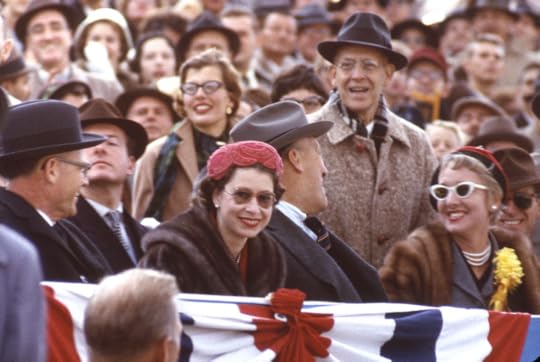
Queen Elizabeth II on a 1957 visit to the U.S. Photo: Bob Lerner, LOOK Magazine. Prints and Photographs Division.
Queen Elizabeth II reigned over the United Kingdom for nearly a third of the United States’ existence, a poignant observation from the national capital of a country that her predecessors once fought to keep as a colonial outpost.
She started out as a princess, became queen and seemed to evolve into the definition of regal restraint and poise. She was the longest reigning monarch in her nation’s history, a woman who kept a stiff upper lip and her head above the tumults of the day, be they the end of the nation’s colonial empire or of family scandals. Her job was to personify the national ideal and she did.
She visited the Library twice and left the staff in awe both times. The lady had presence.
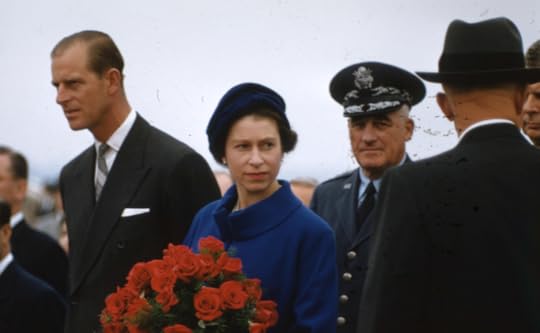
Queen Elizabeth II and Prince Philip on their 1957 visit to the U.S. Photo: Bob Lerner, LOOK Magazine. Prints and Photographs Division.
The first was in 1951, when she was Princess Elizabeth, and then in 1991, when she was Queen Elizabeth II.
Here’s account of the latter visit from the Library’s Information Bulletin:
“On May 15 the Library rolled out the red carpet. The occasion was a call from Her Majesty Queen Elizabeth II, as part of a three-day state visit to Washington. She came came with a party of 17, including her husband, Prince Philip, the Duke of Edinburgh.
As hundreds of onlookers craned their necks, stood on their toes, binoculars at the ready, for even a peek at her majesty from behind a blockade across the street, the official party was greeted at about 1 p.m. … A long, black limousine with the queen arrived at the southwest front of the Jefferson Building driveway …”
The royal party was greeted by then-Librarian of Congress James H. Billington and led up a red carpet to be received by a large delegation of Senators and Congressmen. A high school band played, and a reception included film and entertainment personalities including actors Jane Fonda (with her then-husband Ted Turner), Ben Kingsley and Angela Lansbury, who, with director Martin Scorsese, were in attendance as part of a British film festival co-sponsored by the Library and BAFTA, the British Academy of Film & Television Arts.

Princess Elizabeth and the Duke of Edinburgh visiting “Shrine” documents at the Library of Congress, November 1951. Library of Congress Archives
In 1951, she was still Princess Elizabeth and Harry Truman was still president.
Here’s how the Library’s Information Bulletin recorded that visit:
“Their Royal Highnesses, Princess Elizabeth and the Duke of Edinburgh, expressed great pleasure that [the Library of Congress] was included in their tour on Friday, and the Princess was deeply impressed with the fact that so many staff members turned out to greet them. Mr. Clapp conducted the 20-minute tour of [the Library], which included viewing the Main Reading Room from the Gallery and exhibits on the second floor.
“In addition to Their Royal Highnesses, the Royal party included the British Ambassador Sir Oliver Franks and Lady Franks, Canadian Ambassador Hume Wrong and Mrs. Wrong, Canadian Secretary of State for External Affairs Lester Pearson and Mrs. Pearson, the Princess’ Lady in Waiting, Their Royal Highnesses’ Equerry, the Secretary of the Royal Household, and Mr. John F. Simmons, chief of protocol in the State Department. Official photographers and press representatives also accompanied the party. LC staff members who were presented to the Royal couple were: Messrs. Buck, Mearns, Andreassen, Adkinson, Wagman, Keitt, Fisher, Gilbert, Krould and Webb.
“Besides viewing the Main Reading Room and the Shrine documents, the visitors saw the memorabilia of the Presidents, the “Milestones of American Achievement” and other regular LC exhibits, and a special display arranged in their honor, which included: A letter of condolence on the death of President Lincoln from Queen Victoria to Mrs. Lincoln; a letter from Thomas Jefferson to James Monroe calling attention to the importance of friendship with Great Britain; a letter in King George V’s handwriting to President Wilson expressing “deep satisfaction” that the two English-speaking nations were working together; and a sketch of the Battle of Trafalgar between Lord Nelson and the combined fleets of France and Spain, with a letter describing the action.
“Both the Princess and the Duke expressed keen interest in the exhibits. They had learned the Gettysburg Address and were pleased to see the original; the Princess was particularly interested in Queen Victoria’s letter, asking how LC happened to have it; the Duke studied the sketch of the Battle of Trafalgar; and both of them asked questions about the Shrine documents and the new preservation processes.”
It was, of course, another time. There’s a new King now, Charles III, and a new era. Carry on.
Subscribe to the blog— it’s free!
September 8, 2022
Library Literacy Awards
This guest post was written by Judith Lee, Library of Congress Literacy Awards Program Manager.
September is an exciting month. Teachers, students, and parents alike adjust to the new school year, shorts and sandals get tucked away, and the words “warm” and “cozy” return. And on September 8, International Literacy Day, we are thrilled to announce the 2022 Literacy Awards winners and honorees!
Based on recommendations from members of the Literacy Awards Advisory Board, Librarian of Congress Dr. Carla Hayden has selected three top winners and 12 Successful Practices Honorees for this year. These awards are made possible through the generosity of philanthropist David M. Rubenstein.
2022 Literacy Award Winners 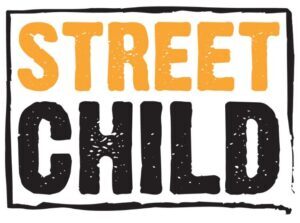
This year’s top prize, the David M. Rubenstein Prize ($150,000) is awarded to Street Child. Founded in 2008, Street Child is a UK-based international charity currently operating in 20 of the world’s most vulnerable countries. Its programs have meaningfully transformed educational opportunities for over half a million children, often through the help of local partnerships and within the context of post-emergency response. Street Child uses evidence-based pedagogical methods while keeping costs low. The organization believes that all children should be in school, safe, and learning. With the David M. Rubenstein Prize, the Library of Congress Literacy Awards Program recognizes Street Child’s outstanding and measurable contribution to increasing literacy levels in multiple parts of the world.
The American Prize ($50,000) is awarded to Make Way for Books. Established in 1998, Make Way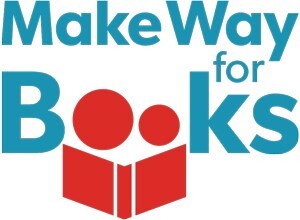 for Books provides early literacy programming to young children and their families who may not otherwise have access to books or quality early education in southern and central Arizona. The organization’s two-generation approach builds skills in both young children (ages birth to 5) and their caregivers. Make Way for Books is bilingual in content, culturally sensitive in methodology, and representatively diverse in staffing. The program is well-established, highly regarded, and growing. It serves 25 school districts and close to 18,000 young children. The Library of Congress Literacy Awards Program recognizes Make Way for Books for its significant and measurable contribution to increasing literacy levels in the United States.
for Books provides early literacy programming to young children and their families who may not otherwise have access to books or quality early education in southern and central Arizona. The organization’s two-generation approach builds skills in both young children (ages birth to 5) and their caregivers. Make Way for Books is bilingual in content, culturally sensitive in methodology, and representatively diverse in staffing. The program is well-established, highly regarded, and growing. It serves 25 school districts and close to 18,000 young children. The Library of Congress Literacy Awards Program recognizes Make Way for Books for its significant and measurable contribution to increasing literacy levels in the United States.
The International Prize ($50,000) is awarded to Young African Refugees for International  Development (YARID). Founded in 2007, YARID is an educational nonprofit based in Kampala, Uganda. YARID was established by Congolese refugees who formed connections with fellow refugees and local Ugandan youth through football games. Using sports as an initial and strategic unifier, the participating refugees soon realized they needed a common language in order to communicate with one another and began offering English literacy classes. This initiative encouraged participants to seek and gain employment opportunities. YARID’s target audience grew from 30 young refugees in its first year to now nearly 5,000 learners. The Library of Congress Literacy Awards Program recognizes YARID’s significant and measurable contribution to increasing literacy levels in Uganda.
Development (YARID). Founded in 2007, YARID is an educational nonprofit based in Kampala, Uganda. YARID was established by Congolese refugees who formed connections with fellow refugees and local Ugandan youth through football games. Using sports as an initial and strategic unifier, the participating refugees soon realized they needed a common language in order to communicate with one another and began offering English literacy classes. This initiative encouraged participants to seek and gain employment opportunities. YARID’s target audience grew from 30 young refugees in its first year to now nearly 5,000 learners. The Library of Congress Literacy Awards Program recognizes YARID’s significant and measurable contribution to increasing literacy levels in Uganda.
2022 Successful Practices Honorees
In addition to our top three winners, the Library of Congress Literacy Awards Program recognizes 12 organizations for their successful implementation of a specific literacy practice. Together, this year’s Successful Practices Honorees are empowering adults in the United States, engaging local communities, promoting a culture of reading in schools and at home, and nurturing partnerships to have a broader effect on reducing illiteracy in the United States and abroad. This year’s Successful Practices Honorees are:
Concern Worldwide, Niamey, NigerDIBS for Kids, Omaha, NebraskaDominican Republic Education and Mentoring (DREAM) Project, Milton, Vermont (operating in the Dominican Republic)Impact Network International, Brooklyn, New York (operating in Zambia)International Literacy and Development (ILAD), Duncanville, TexasKids Read Now, Troy, OhioLiteracy Achieves, Dallas, TexasLiteracy Action, Atlanta, GeorgiaLiteracy Network, Madison, WisconsinReadWorks, Brooklyn, New YorkServeMinnesota (Reading Corps), Minneapolis, MinnesotaWorld Education, Boston, Massachusetts (operating in the United States, Africa, and Asia)Finally, we want to thank all of this year’s applicants for their commitment to combating illiteracy and promoting reading both in the United States and abroad.
About the Awards
Through the generosity of philanthropist David M. Rubenstein, the Library of Congress Literacy Awards Program honors nonprofit organizations that have made outstanding contributions to increasing literacy in the United States or abroad. The awards also encourage the continuing development of successful methods for promoting literacy and the wide dissemination of the most effective practices. They are intended to draw public attention to the importance of literacy, and the need to promote literacy and encourage reading.
2022 marks the tenth year that the Literacy Awards Program has recognized organizations for their outstanding achievements in advancing literacy. Over the past decade, this program has awarded more than $3 million in prizes to over 150 institutions working in 38 countries. We invite you to check out this interactive map for a visual summary all of the organizations that have been awarded or honored by Library of Congress Literacy Awards Program over the past ten years.
September 7, 2022
National Book Festival: Thousands Spent the Holiday with a Good Book
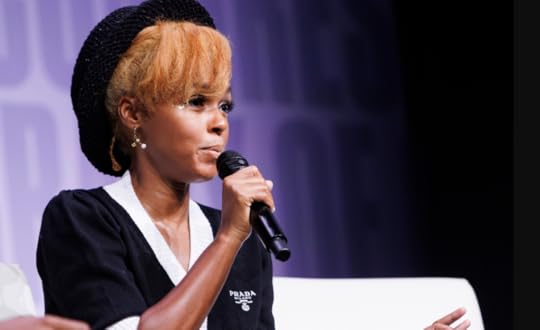
Janelle Monáe spoke to a packed room on the NBF’s main stage. Photo Shawn Miller.
Reading is often a solitary pursuit, yet books can bring us together —many thousands of us, in fact, if Saturday’s joyous National Book Festival is any measure.
“It’s wonderful to be back at the Washington Convention Center in person and to see all of these smiling faces,” Librarian of Congress Carla Hayden said to cheers as she opened the festival on the main stage.
It was the Library’s first in-person festival since the pandemic forced writers and readers into their separate spaces. The crowds, the energy and the buzz mirrored the festival’s theme — literally, that books bring us together.
As festivalgoers entered the convention center, purple-T-shirted volunteers greeted them with a friendly “Welcome back!” (For the past two years, the festival had been online, as much of D.C. was shut down due to the pandemic.) At a central information booth, they picked up printed programs, posters and C-SPAN book bags, a perennial favorite bit of swag.
From Pulitzer Prize-winning historian David Maraniss, music sensation Janelle Monáe, Instagram star Leslie Jordan and disability advocate Nyle DiMarco to civil rights legend Ruby Bridges, Hayden promised something for just about everyone. “It’s gonna be a fantastic day!”
Following Hayden, actor turned bestselling author Nick Offerman delighted fans in a conversation with National Park Service ranger Millie Jimenez about his latest book, “Where the Deer and Antelope Play: The Pastoral Observations of One Ignorant American Who Loves to Walk Outside.”

NPS ranger Millie Jimenez and Nick Offerman delighted the crowd. Photo: Shawn Miller.
Offerman was one of more than 100 authors who appeared on 11 festival stages. They hailed from 25 states and the District of Columbia; they ranged from Pulitzer Prize winners to debut writers (17 of them); and, over the past year, they wrote fiction, nonfiction, poetry and children’s literature reflecting the “diversity of readers across our nation,” as Hayden put it.
Some tackled tough subjects (racism, climate change) and explored solutions; others wrote about ways to find joy amid the challenges of modern life. And yet others explored worlds filled with unforgettable characters and dramatic revelations.
Pulitzer Prize-winning journalist Will Bunch addressed debates about higher education, a subject so surrounded by “bad vibes,” he said, that it has become a fault line in American politics.
Some families fret their kids won’t get ahead if they don’t get into the “right” university, while others who can’t afford college or don’t go — nearly half the population, Bunch said — fear that “people think that they’re less worthy, that they lack merit.”
Indeed, fear is the “prevailing attitude around higher education nowadays” Bunch told the Washington Post’s Alexandra Petri in a conversation about his new book, “After the Ivory Tower Falls: How College Broke the American Dream and Blew Up Our Politics — and How to Fix It.”
The solution, in Bunch’s view, involves a return to a post-World War II mindset, when the GI Bill made higher education a public good, and support of young people outside traditional universities. “We need to have free trade schools, we need to have internships,” Bunch said.
Many other writers appeared in pairs, trios or even, in the case of “Blackout” on the Main Stage (a celebration of Black teen love), a quintet.
Sessions this year had titles alerting festivalgoers to the subject matter of presentations in case they weren’t familiar with the writers speaking.
Titles included “Heal Thyself?: Mental Illness and Me,” in which Rachel Aviv and Daniel Bergner cited their own experiences (and their respective books) in discussing the limits of modern treatments for mental crises, and “Is Anything Funnier Than Politics?,” in which Susan Coll, Grant Ginder and Xochitl Gonzalez explored the role of secrets in intricate family politics and the way comedy offers an avenue for emotional release in the face of pain.
In “We Knew Them Before They Were Famous,” Louis Bayard and Karen Joy Fowler paired up to talk about their new historical novels — Bayard’s focusing on one of the most beloved figures in American history (Jacqueline Kennedy), and Fowler’s imagining the family of one of the most reviled (John Wilkes Booth).
Bayard’s “Jackie & Me” depicts the relationship that grew between Jackie and Lem Billings, John F. Kennedy’s best friend and a closeted gay man, in the run-up to the Kennedys’ marriage.
Often, queer people have been left out of history, Bayard said. But now, stories such as his are being told about “people who have always been there, just hiding in the corners of their public lives.”
Fowler joked that her Booker Prize-nominated novel, “Booth,” with its exploration of the Lincoln assassin’s eccentric family, shows that “people who don’t murder presidents can be just as interesting as people who do.”
Performances of literary works, new to the festival this year, brought characters from across centuries and worlds to life on two stages.

Crowds streamed in for the first in-person NBF in three years.
On the Pop Lit stage, three actors performed a scene from “The Conjure-Man Dies,” set in an undertaker’s office in Harlem just after a murder. Written by Rudolph Fisher and first published in 1932, “Conjure-Man” was the first full-length mystery novel to feature an all-Black cast of characters, and the Library republished it this spring as part of its Crime Classics series.
In “My Book Is Talking to Me,” three award-winning audiobook narrators from the National Library Service for the Blind and Print Disabled shared secrets of their craft and performed passages from “Pride and Prejudice” by Jane Austen; “The Wonderful Wizard of Oz” by L. Frank Baum; and “Passing” by Nella Larsen.
And, surrounded by comfy couches and colorful beanbags on the Please Read Me a Story stage, actors from the group Literature to Life acted out excerpts from “Black Boy” by Richard Wright; “If Beale Street Could Talk” by James Baldwin; and “The Brief Wondrous Life of Oscar Wao” by Junot Díaz.
Elsewhere, children and families took selfies in front of a Dav Pilkey “Dog Man and Cat Kid” blowup; selected free books at Scholastic’s booth; lined up to spin a colorful wheel for prizes at the Washington Post’s; built electrical circuits at General Motors; and gathered souvenirs from states around the country in the lively Roadmap to Reading area.
Many also learned about the Library. Antonio Parker of the Internship and Fellowship Programs Section said his booth was busy nonstop. Mark Layman of NLS said crowds of kids patiently absorbed themselves in braille coloring by numbers. And Tammy Wong of the Geography and Map Division said a colorful replica map visualizing the texture of the mid-Atlantic ocean floor fascinated dozens of children.
As always, books sales (from Politics and Prose) and signings (managed by the Junior League of Washington) attracted thousands to the expo floor. While waiting in signing lines, festivalgoers could be seen sitting on the floor reading their just-purchased books.
Sahar Kazmi contributed to this story.
The 2022 National Book Festival was made possible by the generous support of private- and public-sector sponsors who share the Library’s commitment to reading and literacy, led by National Book Festival Co-Chair David M. Rubenstein. Sponsors include: Institute of Museum and Library Services, The Washington Post, AARP, General Motors, James Madison Council, John W. Kluge Center, National Endowment for the Arts, National Endowment for the Humanities, Scholastic and Sharjah Book Authority. Presenting Partner C-SPAN and Media Partners NPR and El Tiempo Latino.
August 31, 2022
“Blackout” Brings Black Teen Romance to the NBF
“Blackout,” the hit YA romance novel of interlinked stories written by six Black authors, is coming to the National Book Festival’s main stage.
It’s sure to be one of the festival’s highlights, as the event will put five of those authors on one stage: Dhonielle Clayton, Tiffany D. Jackson, Nic Stone, Ashley Woodfolk and Nicola Yoon. They’ll be onstage Saturday, Sept. 3, from 4-5 p.m., and the event will be livestreamed. They’ll be signing books starting at 5:30. (Coauthor Angie Thomas will not be able to join the presentation, alas.)
“Blackout,” set during a power outage in New York, takes readers on a tour of the city and of young Black couples in various stages of romance. All of their stories are interrelated, and they’re all trying to get to a party in Brooklyn. “Even Love Stories Can Glow When the Lights Go” is the book’s tag line and the key to the book’s heartwarming point of view.
The collaboration, born during the pandemic shutdown, is the brainchild of Clayton, an executive at the nonprofit We Need Diverse Books; an author (“Tiny Pretty Things”); and a former librarian (!). She drew in friends and collaborators to tell an upbeat set of stories during a difficult time, picking authors who had a finger on the pulse of Black teens and who each wrote with a unique voice. She wanted the result to be a “celebration.”
“It’s our love letter to Black love, to Black kids and to New York City,” she said. “I wanted to also show them that they are worthy of love no matter what they look like and who they are …. We wanted to write our own love letter to them and say, ‘Hey, your love is valid.’ ”
The result was a bestseller that is now in development for adaptation as a six-part anthology at Netflix, powered by Higher Ground, the production company formed by Barack and Michelle Obama. Netflix’s summary: “When the lights go out and people reveal hidden truths, love blossoms, friendships transform, and all possibilities take flight.”
It was so much fun to put together that the group will be back on bookshelves in November with “Whiteout,” another set of linked teen romances, this time set during an Atlanta snowstorm.
Yoon, who has written bestsellers that also were turned into films, such as “Everything Everything” and “The Sun is Also a Star,” said the joint project was a nice break from the solitary experience of a novelist.
“Usually you’re alone in your little cave,” she said. “But I got to write with these women who are so remarkably talented, and we share a point of view of the world, especially on Black love.”
Jackson, born and raised in New York and author of “Allegedly” and “Monday’s Not Coming,” provided some of the city-specific detail that makes the Big Apple seem “magical.”
“It was important for us to hit all the staples where I remember being in love,” she said. “I remember being in love sitting in front of the library. I remember being in love on the subway.”
Those stories and more, coming your way at the NBF.
“The All-Stars of ‘Blackout’ ” will be on the main stage of the National Book Festival Saturday, Sept. 3, from 4-5 p.m. They will each be signing books beginning at 5:30.
August 29, 2022
Nuyoricans at the National Book Festival: Xochitl Gonzalez and “Olga Dies Dreaming”
“Olga Dies Dreaming,” one of this year’s breakout popular novels, opens with a great set piece. The titular character, Olga Acevedo, an upscale wedding planner in New York, is sweating the critically important detail of …. napkins. Linen, of course, but the hemstitch border? The color — white, ivory, a touch of blue? How should they be folded? What about — heaven forbid — lint?
And, most delicately: How many hundreds of them can she plausibly over-order, keeping the surplus for a relative’s wedding?
Author Xochitl Gonzalez, who will be at the National Book Festival on Sept. 3, renders this scene with wit and in granular detail, in large part because, like her protagonist, she was a high-end, high-energy wedding planner of Puerto Rican descent in New York for more than a decade.
“The napkins is an absolutely true story,” she laughs in a recent interview. “It was such a perfect way to think about class (divisions).”
The novel starts in 2017 with Olga at 40 — single, child-free, work-obsessed — involved in an icky affair with a wealthy, white multimillionaire nearly 15 years her senior. (She had orchestrated the wedding of his daughter, while he was still married.) And, we learn, extra napkins aren’t the only thing Olga is grifting from her uber-wealthy clients; she’s also hustling liquor with a front for the Russian mafia. This is when she meets Matteo, a mixed-race real estate agent who’s got a certain charm and a furniture-hoarding problem.
Her brother Pedro is the congressman who represents their home district. He cares about their Puerto Rican neighborhood, but as a closeted gay man, finds himself being blackmailed by big-time developers into clearing the way for the neighborhood’s gentrification.
The siblings are close, in part because their parents were socialist revolutionaries who abandoned them as teens. Their mother took off for a clandestine life across the Caribbean and Latin America. Now living in hiding, she sends them haranguing letters about how they are betraying The People. Their father died from AIDS as a drug addict.
It’s an engaging plot energetically told, and it’s no surprise to learn that a one-hour pilot on Hulu was in development even before the book was published in January.

The cover of “Olga Dies Dreaming.”
But, as the pages flip past, the story draws deeper into the well of what the American Dream might actually mean to Caribbean immigrants, their children and the larger society in which they find themselves. There’s also the business of families, secrets and finding oneself in a sea of contradictory social forces, particularly when their mother barrels back in their lives when Hurricane Maria devastates Puerto Rico.
“The real impetus (for the book) was how I’ve always just been raised to be concerned about colonialism and Puerto Rico,” says Gonzalez. “That was always in the background, even when my parents weren’t in the foreground of my life. This was a way to explore a lot of my passions …. In some ways, I say the character of Olga is me without 10 years of therapy.”
The story is tightly autobiographical, Gonzalez says, because she started writing it as a memoir, switching to fiction so she could encompass larger themes and multiple story lines.
Like her heroine, the 45-year-old Gonzalez is a Brooklynite of Puerto Rican descent, was mostly raised by her grandparents and went to public high school but an Ivy League college (Brown, in the author’s case). Both heroine and author are the children of radical socialists who were more bent on world revolution than parenting and were raised by grandparents. (Gonzalez’s mother is Puerto Rican; her father, Mexican.) She was an only child. The closeted brother, she says, is one of the story’s primary fictional additions.
She wound down her wedding-planning business when she turned 40, having an “entrepreneurial heart attack” about wanting to become a writer. She went to work at Hunter College, but wrote fiction from 5 to 7 a.m. with more writing time on the weekends. Several months later, she was accepted into the Iowa Writers’ Workshop, where she wrapped up the first draft of the book. She finished revisions during the pandemic.
The book’s title is a key to its ambitions. It stems from Pedro Pietri’s poem “Puerto Rican Obituary,” a foundational document of the Nuyorican movement of the late 1960s and early 1970s. It relates the bitter reality of Puerto Ricans in New York versus their dreams of American happiness. It tells and retells of the working-class lives and deaths of “Juan Miguel Milagros Olga Manuel,” with one death notice reading “Olga/died dreaming about real jewelry.”
Here’s a bit of the poem’s mood:
“They knew
they were born to weep
and keep the morticians employed
as long as they pledge allegiance
to the flag that wants them destroyed”
Those contrasting forces — to assimilate, to stand free; to cash in, to resist — are the larger forces at work in Olga’s family.
Gonzalez, meanwhile, said she also wanted to preserve the memory of her childhood, of the way things used to be in her hometown.
Being a Nuyorican, she says, is “going extinct because of gentrification. And so in a lot of ways I wanted to pay homage to that …. I really wanted to just sort of put a stamp in the ground about the Brooklyn that I knew, the Nuyorican culture that I loved and was a part of what nurtured me as a kid.… This felt like a way to write a love letter to all those things.”

Xochitl Gonzalez drew on her experience as a wedding planner for key parts of “Olga Dies Dreaming.”
Xochitl Gonzalez will be on the Pop Lit stage for the “ Is There Anything Funnier than Politics? ” panel in Ballroom A from 3:25-4:25 p.m. She will be signing copies of “Olga Dies Dreaming” in line 7 from 5:00-6:00 p.m.
Subscribe to the blog— it’s free!
August 25, 2022
Just in Time for the National Book Festival, it’s Leslie Jordan!
Leslie Jordan has been a lot of things over his 67 years – professional horse rider, Emmy Award-winning actor, singer, recovered alcoholic, self-described “Southern Baptist sissy,” Instagram sensation and bestselling author.
The last is what brings him to this year’s National Book Festival, as his “How Y’all Doing? Misadventures and Mischief from a Life Well-Lived” has found an audience for his voice on audiobooks and the printed page. (He’ll be interviewed for former “Will & Grace” co-star Megan Mullally.) You can hear his Tennessee twang even if you’re just reading him. The word may be “spectacular,” but he pronounces it (when describing his friends and acting colleagues) “spack-TACK-u-lar” and it just wouldn’t be him if he pronounced it any other way.
He’s joining us today for a video interview from his apartment in West Hollywood on a gorgeous midsummer afternoon. He’s lived in the L.A. area for four decades, longer than he lived in his native Chattanooga, Tennessee, but the accent never left him. It’s a good thing, too, as it’s helped him chart a unique career path, overcoming an agent’s early concern that it would be too limiting. He’s also famously not tall — he stands just shy of 5 feet — and parlayed that, too, into his style. He’s racked up more than 130 television and film credits, often as a supporting actor with the memorable zinger. He starred on “Will & Grace,” for which he won an Emmy, and had several memorable turns on “American Horror Story.” He’s currently starring in “Call Me Kat,” opposite Mayim Bialik.
“How Y’all Doing?” — part memoir, part essay collection — stems from his unlikely late-career success as an Instagram sensation. He started posting at the behest of young television staffers on the show who urged him to “Post that!” when he had a funny line.
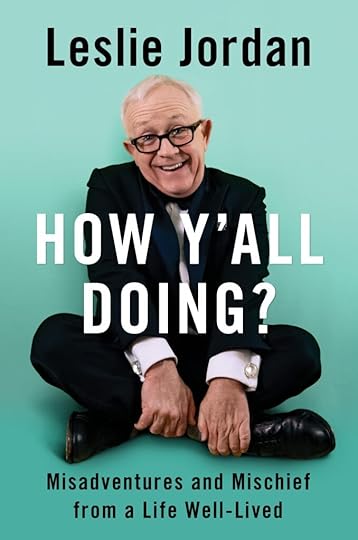
Leslie Jordan will be at the National Book Festival on Sept. 3, discussing “How Y’all Doing?”
Then, during the pandemic, isolated at his apartment, he started taping short bits on his phone, staring straight at the camera. They were as simple as they were hilarious. One after another went viral, until he amassed some 5.8 million followers, most of whom, he says, had no idea he was an actor.
“It’s very young and it’s all female,” he says of his audience. “I don’t have a single man following me … It’s young girls and they just adore me.”
One of his most popular bits was his August 2020 pearl-clutching reaction to a famously profane song by Cardi B and Megan Thee Stallion, the title of which we’ll skip here. It’s 43 seconds of comic perfection. He bops to the music — then realizes the lyrics with a jolt of horror. He puts his hand to his mouth, eyes flying wide open: “Oh lord, oh no no no no!” He laughs, embarrassed, and stammers, “That’s just shocking,” with all the earnestness of your favorite Southern grandmother.
“Well,” he finally says, primly pursing his lips. “I don’t judge. I guess every garbage can has its lid.”
It has millions of views across several platforms.
“If he’s not the cutest thing on the planet, I don’t even know,” one viewer posted, a comment that itself drew more than 3,000 likes.
Book editors approached him with the book’s concept and title, taking some of his Instagram postings as chapter starters. He did not realize until he sat down to write, he says, that his posts all had a beginning, middle and end, mini-stories just waiting to be fleshed out.
“I wrote every word of it myself and turned it in,” he says. “They couldn’t believe it. No ghostwriter, no anything. I would write in longhand some ideas that I had because I learned that when you put pen to paper, it slows your mind down to the speed of a pen and you get some clarity … it just flowed. It was easy.”

Leslie Jordan in “American Horror Story.”
He’s at his best, perhaps, when talking about growing up in the South, coming of age as a gay kid when that just wasn’t done. He admired two flamboyant gay Southern icons who showed a way to be who he was: “Truman Capote and Tennessee Williams saved my life.”
When asked about the difficulties of telling his very Baptist mother that he was gay, he tells the story in vintage Leslie Jordan style, his voice rising and falling, stopping and starting, drawing out the vowels as full syllables.
It goes like this:
“So she said to me, she said, ‘You know, Leslie, if you choose this lifestyle, you’re going to be subject to ridicule. And I do not think that I could bear that. And so what my my advice is’ — and then she didn’t pull her Bible out. I thought for sure she’d pull her Bible out — and she said, ‘No, I want you to live quietly.’ ”
He pauses with a straight face. Then he bursts into an impish smile, waving his hands way above his head, then he’s laughing at how he’s turned out all these years later, as one of the most visibly gay actors in Hollywood: “Here I am! Whoo-hoo!“

Leslie Jordan cuts up with his “Call Me Kat” co-stars, Vanessa Lachey (l) and Mayim Bialik (r).
Leslie Jordan will be in conversation with Megan Mullally at the National Book Festival on Sept. 3. They will be on the Main Stage from 5:30-6:30 p.m. Jordan will be signing copies of “How Y’all Doing?” in line 12 from 7:00-8:00 p.m.
Subscribe to the blog— it’s free!
Library of Congress's Blog
- Library of Congress's profile
- 74 followers



